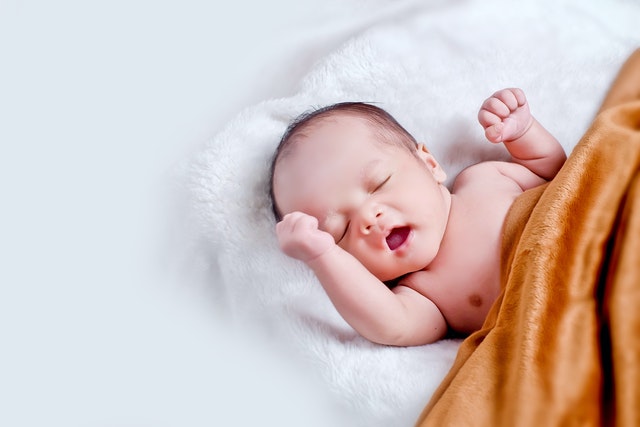Whether you are a parent with a baby or a nanny caring for one, use this fact sheet from the Centers for Disease Control and Prevention for information on how to keep your baby healthy and safe during the COVID-19 pandemic.
Get vaccinated
- COVID-19 vaccines reduce the risk of people getting COVID-19 and can also reduce the risk of spreading it.
- Be sure to get everyone in your family who is 5 years of age or older vaccinated and up to date with their COVID-19 vaccines.
Do not put a mask or face shield on your baby
Babies move frequently. Their movement may cause the plastic face shield or mask to block their nose and mouth, or cause the strap to strangle them.
- Children younger than two should not wear masks or face shields.
- Putting a face shield or mask on your baby could increase the risk of sudden infant death syndrome (SIDS) or could strangle or suffocate your baby.
Limit visitors to see your new baby
The birth of a new baby typically brings families together to celebrate. Before allowing visitors into your home:
- Consider the risk of COVID-19 to yourself, your baby, people who live with you, and visitors, like grandparents or other people at increased risk of severe illness from COVID-19.
- Bringing people who do not live with you into your home can increase the risk of spreading COVID-19.
- Some people without symptoms can spread the virus.
- Limit in-person gatherings and consider other options, like celebrating virtually, for people who want to see your new baby.
Keep 6 feet between your baby and people who do not live in your household and between your baby and those who are sick
- Consider the risks of COVID-19 to you and your baby before you decide whether to go out for activities other than healthcare visits or child care.
- Ask your child care program about the plans they have in place to protect your baby, family, and their staff.
Know possible signs and symptoms of COVID-19 infection in babies
Babies under 1 year old might be more likely to have severe illness from COVID-19 than older children, but most babies who test positive for COVID-19 have mild or no symptoms.
- Reported symptoms in newborns with COVID-19 include fever, being overly tired or inactive, runny nose, cough, vomiting, diarrhea, poor feeding, and trouble breathing or shallow breathing.
- If your baby develops symptoms or you think your baby may have been exposed to COVID-19:
- Get in touch with your baby’s healthcare provider within 24 hours and follow steps for caring for children with COVID-19.
- If your baby has emergency warning signs (such as trouble breathing), get emergency care immediately. Call 911.
Don’t skip your baby’s healthcare appointments. Newborn visits should be done in person, if possible. That way your baby’s healthcare provider can:
- Check how you and your baby are doing overall.
- Check your baby’s growth and feeding.
- Check your baby for jaundice.
- Make sure your baby’s newborn screening tests were done and do any repeat or follow-up testing.
If you think you or your baby might have COVID-19 or might have been exposed to someone with COVID-19, call your baby’s healthcare provider before visiting.
Make sure your baby sleeps safely
Safe sleep is an important part of keeping babies healthy. Take steps to help your baby sleep safely and reduce the risk of sleep-related infant death, including sudden infant death syndrome (SIDS):
- Place your baby on their back for all sleep times – naps and at night.
- Use a firm, flat sleep surface, such as a mattress in a crib covered by a fitted sheet. Your baby shouldn’t sleep on an adult bed, cot, air mattress, couch, or chair.
- Have the baby share your room but not your bed. Your baby should sleep on their own surface, separate from you and other adults or children.
- Keep soft bedding – such as blankets, pillows, bumper pads, and soft toys – out of your baby’s sleep area.
- Do not cover your baby’s head or allow your baby to get too hot. Signs your baby may be getting too hot include sweating or their chest feeling hot.
- Don’t smoke or allow anyone to smoke around your baby.
Ensure your own social, emotional, and mental health
During the COVID-19 pandemic, parents may be extra stressed and tired.
- Learn about ways to cope with stress and tips for caring for yourself during the COVID-19 pandemic.
- Call your healthcare provider if you think you are experiencing depression after pregnancy.
© 2022 Zywave, Inc. All rights reserved.
Need help caring for your baby, or children of any age? Our professional, reliable, thoroughly screened nannies and sitters are here for you. Contact us at (518) 348-0400 today!

